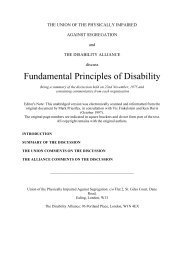Global-Report-Living-Colour-dr2-2
Global-Report-Living-Colour-dr2-2
Global-Report-Living-Colour-dr2-2
Create successful ePaper yourself
Turn your PDF publications into a flip-book with our unique Google optimized e-Paper software.
110<br />
Inclusive Communities = Stronger Communities<br />
GLOBAL REPORT ON ARTICLE 19: THE RIGHT TO LIVE AND BE INCLUDED IN THE COMMUNITY<br />
“An institution is any place in which<br />
people who have been labeled as<br />
having an intellectual disability are<br />
isolated, segregated and/or<br />
congregated. An institution is any<br />
place in which people do not have,<br />
or are not allowed to exercise<br />
control over their lives and the dayto-day<br />
decisions. An institution is not<br />
defined merely by its size.”<br />
– The Canadian Association for<br />
Community <strong>Living</strong> – People First of<br />
Canada Task Force on the Right to<br />
Live in Community<br />
This section will present and discuss some of the major<br />
lessons learned as a result of past and ongoing<br />
institutional closures and some of the challenges that still<br />
remain as we move toward fuller compliance with Article<br />
19 of the UN Convention.<br />
Institutions are a direct contravention of the CRPD, Article<br />
19 and the right of persons with disabilities to have the<br />
same opportunity to choose where they live, with whom<br />
they live, and not be forced to live in a particular living<br />
arrangement.<br />
“I want to go back to Fukushima!” “I cannot stand the<br />
life in this institution, since I cannot have my privacy.”<br />
“I want to go shopping and hold the event of selfadvocacy<br />
activity as I want.” “I feel like I time travel to<br />
the old days when I was institutionalized.” “I want to<br />
have my own room as before.” “I want to work again in<br />
Fukushima as soon as possible.”<br />
– Self Advocate, after the Tsunami in 2011 Japan<br />
Photo: Ulrich Eigner<br />
We have learned that when asked, people<br />
with intellectual disabilities choose not to<br />
live in institutions. We know that institutions<br />
deny people basic rights of citizenship,<br />
personal control, personal privacy, decisionmaking<br />
and inclusion in community. Based<br />
on personal stories as told by people who<br />
have lived in these facilities, we know of the<br />
abuse, isolation and personal suffering that<br />
invariably occurs in these facilities. Not only<br />
do we continue to face the challenge of<br />
closing the institutions which exist, we also<br />
must address the legacy that institutional<br />
care has left on our approach to supporting people in the<br />
community and we must guard against the threat of new<br />
investments in institutions and institutional approaches.<br />
To do this it is helpful to understand what we have<br />
learned about the closure process which has taken place<br />
in many countries.



